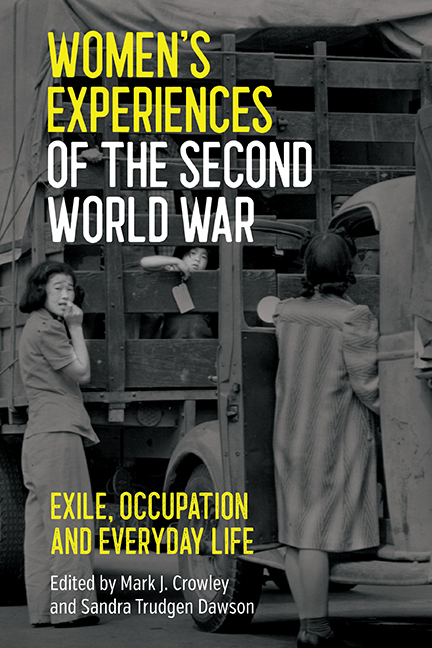Book contents
- Frontmatter
- Dedication
- Contents
- List of Illustrations
- List of Contributors
- Acknowledgements
- List of Abbreviations
- Introduction: Women’s Experiences of the Second World War: Exile, Occupation and Everyday Life
- Part One Living in Exile and under Wartime Occupation
- Part Two Living with Wartime Occupiers
- Part Three Everyday Life at Home and on the Battle Front
- Index
5 - A Friendly Invasion? Māori Women, American Servicemen and the Legacies of Wartime Mobilization in New Zealand
Published online by Cambridge University Press: 03 June 2021
- Frontmatter
- Dedication
- Contents
- List of Illustrations
- List of Contributors
- Acknowledgements
- List of Abbreviations
- Introduction: Women’s Experiences of the Second World War: Exile, Occupation and Everyday Life
- Part One Living in Exile and under Wartime Occupation
- Part Two Living with Wartime Occupiers
- Part Three Everyday Life at Home and on the Battle Front
- Index
Summary
Between 1942 and 1944, New Zealand was used as one of the main locations for U.S. forces in the South Pacific Command. Approximately 100,000 American troops were stationed in the country during that period. The past few decades has witnessed the emergence of a sizeable and sophisticated scholarship dedicated to illuminating the social and political effects of American militarization during the Second World War. Sarah Kovner suggests that the breadth and depth of work on the topic means historians are now “in a position to begin putting together both an international and transnational history of how U.S. soldiers and occupation officials negotiated gender and sexuality in many different countries.” Notwithstanding this, much of the scholarship concerned with the social costs of living with the American military and its remarkable territorial expansion overseas during and after the Second World War is still rather blind to the Pacific and Indigenous peoples, particularly women.
In New Zealand, the American occupation is remembered as a ‘friendly invasion’. The stationing of U.S. troops in the country has generated a small body of work that has addressed the American imprint on social and cultural patterns, as well as gender relations, sexual codes and behaviour. Mirroring the absences in international scholarship, the Indigenous experience is not at the heart of New Zealand studies of the Second World War. In recent years, the participation of Indigenous soldiers from New Zealand, Australia and the Pacific has been addressed, but Indigenous women's involvement in the war effort is yet to be examined in depth. In Australia, Karen Hughes has argued that the extant scholarship is “mostly silent on Aboriginal women's wartime experience and intimate relations with foreign allies,” and has “paid scant attention to Aboriginal women's participation” in the war effort. Examinations of the wartime home front in the South Pacific and New Zealand suffer from the same occlusions and absences that Hughes has identified for the Australian historiography.
This chapter draws on oral histories conducted for Mothers’ Darlings of the South Pacific, a collaborative project that examined the social impact of American servicemen on island societies, in order to delineate the impacts of the ‘friendly invasion’ and wartime mobilization upon Indigenous women in New Zealand.
- Type
- Chapter
- Information
- Women's Experiences of the Second World WarExile, Occupation and Everyday Life, pp. 79 - 94Publisher: Boydell & BrewerPrint publication year: 2021



